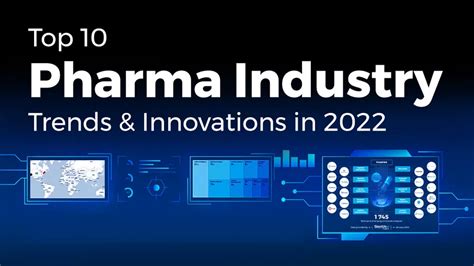The pharmaceutical industry is on the cusp of a revolution, driven by technological advancements and innovative approaches to healthcare. As the global population continues to grow and age, the demand for effective and efficient healthcare solutions has never been more pressing. In response, pharmaceutical companies are embracing cutting-edge technologies to improve the development, manufacturing, and distribution of life-saving medicines.
One of the most significant trends shaping the pharma industry is the rise of digitalization. Digital technologies, such as artificial intelligence (AI), machine learning (ML), and the Internet of Things (IoT), are transforming the way pharmaceutical companies operate. From streamlining clinical trials to optimizing supply chain logistics, digitalization is enabling pharma companies to work more efficiently and effectively.
Personalized Medicine: A New Era in Healthcare

Personalized medicine, also known as precision medicine, is a key area of innovation in the pharma industry. By leveraging advances in genomics, proteomics, and epigenomics, pharmaceutical companies can develop targeted therapies tailored to individual patients' needs. This approach has the potential to revolutionize healthcare by improving treatment outcomes, reducing side effects, and enhancing patient quality of life.
Gene Editing: A Game-Changer for Rare Diseases
Gene editing technologies, such as CRISPR/Cas9, are enabling scientists to edit genes with unprecedented precision and efficiency. This has significant implications for the treatment of rare genetic diseases, which often have limited or no effective treatments. By editing faulty genes, researchers can develop novel therapies that address the root cause of these diseases.
Artificial Intelligence in Pharma: Opportunities and Challenges

Artificial intelligence (AI) is transforming the pharma industry in numerous ways, from clinical trial design to patient engagement. AI algorithms can analyze vast amounts of data to identify patterns and insights that human researchers may miss. However, the adoption of AI in pharma also raises important questions around data quality, regulatory compliance, and patient privacy.
Machine Learning in Clinical Trials: Boosting Efficiency and Effectiveness
Machine learning (ML) is a subset of AI that enables computers to learn from data without being explicitly programmed. In clinical trials, ML can help optimize study design, patient recruitment, and data analysis. By leveraging ML, pharmaceutical companies can reduce trial timelines, improve patient outcomes, and enhance the overall efficiency of the clinical trial process.
The Future of Pharma Manufacturing: Digitalization and Automation

The pharmaceutical manufacturing process is undergoing a significant transformation, driven by advances in digitalization and automation. Digital technologies, such as Industry 4.0 and the Industrial Internet of Things (IIoT), are enabling pharma companies to optimize production workflows, reduce costs, and improve product quality.
Robotics in Pharma: Enhancing Efficiency and Reducing Errors
Robotics is playing an increasingly important role in pharma manufacturing, particularly in areas such as packaging, labeling, and inspection. By leveraging robotics, pharmaceutical companies can improve production efficiency, reduce errors, and enhance product quality.
The Rise of Cell and Gene Therapies: A New Frontier in Medicine

Cell and gene therapies are revolutionizing the treatment of genetic diseases and certain types of cancer. By leveraging advances in gene editing, cell engineering, and gene expression, researchers can develop novel therapies that address the root cause of these diseases.
Immunotherapy: Harnessing the Power of the Immune System
Immunotherapy is a type of cancer treatment that harnesses the power of the immune system to fight disease. By leveraging advances in immunology, oncology, and biotechnology, researchers can develop novel immunotherapies that stimulate the immune system to attack cancer cells.
The Future of Pharma: Emerging Trends and Technologies

The pharmaceutical industry is on the cusp of a revolution, driven by emerging trends and technologies. From digitalization and AI to cell and gene therapies, the future of pharma is looking brighter than ever.
Nanotechnology: A New Frontier in Medicine
Nanotechnology is a rapidly emerging field that involves the manipulation of matter on a nanoscale. By leveraging advances in nanotechnology, researchers can develop novel therapeutics and diagnostics that address a wide range of diseases.
Conclusion
The pharmaceutical industry is undergoing a significant transformation, driven by technological advancements and innovative approaches to healthcare. As the global population continues to grow and age, the demand for effective and efficient healthcare solutions has never been more pressing. By embracing cutting-edge technologies and emerging trends, pharmaceutical companies can develop novel therapies, improve patient outcomes, and enhance the overall efficiency of the healthcare system.






What is personalized medicine?
+Personalized medicine, also known as precision medicine, is an approach to healthcare that involves tailoring medical treatment to an individual's unique genetic, environmental, and lifestyle factors.
How is artificial intelligence being used in pharma?
+Artificial intelligence (AI) is being used in pharma to improve clinical trial design, patient recruitment, and data analysis. AI algorithms can analyze vast amounts of data to identify patterns and insights that human researchers may miss.
What is the future of pharma manufacturing?
+The future of pharma manufacturing is likely to be shaped by advances in digitalization, automation, and robotics. Digital technologies, such as Industry 4.0 and the Industrial Internet of Things (IIoT), will enable pharma companies to optimize production workflows, reduce costs, and improve product quality.
